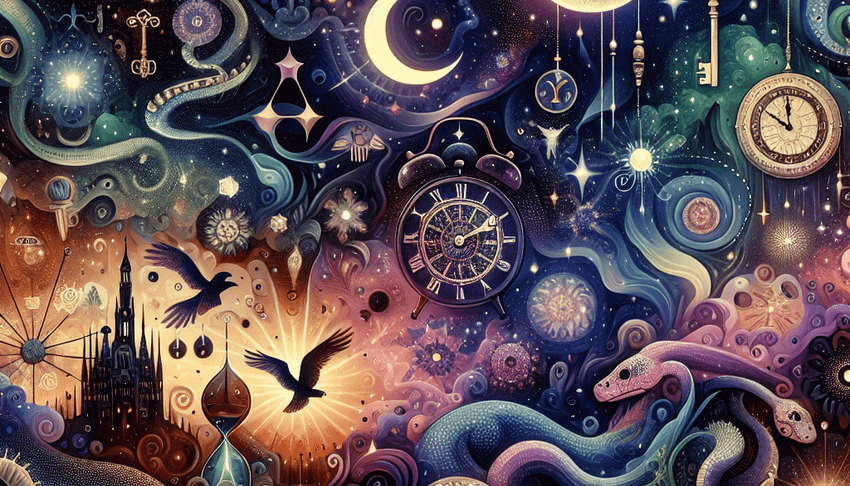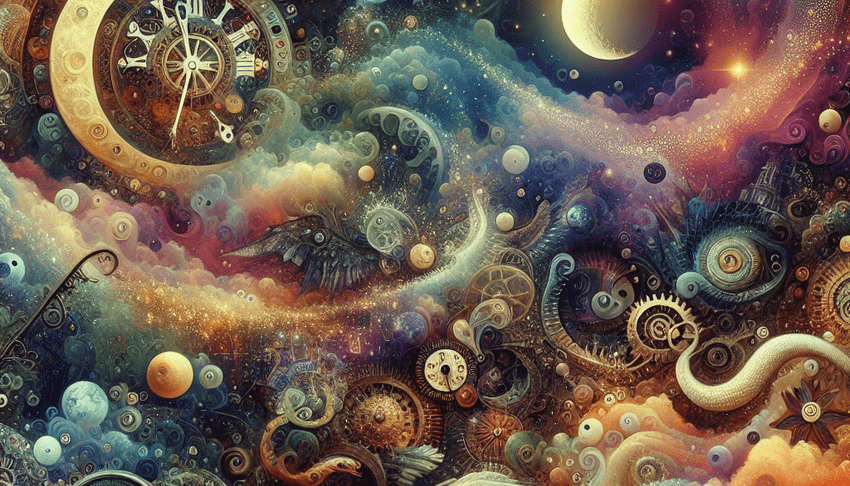Table of Contents
Dreams as Cultural Mirrors

Interpreting Dreams of Foreign Lands
Dreams have a profound way of weaving the fabric of our subconscious with the threads of the unfamiliar. When we find ourselves dreaming of foreign lands, the interpretation of these visions can be a revealing journey into the deeper aspects of our psyche. Cultural dreams and the symbolism of foreign lands in dreams serve as a metaphorical compass, guiding us through our own internal landscapes.
Symbolism of Foreign Cultures in Dreams
Engaging in interpreting dreams about different cultures requires a delicate balance of personal introspection and an understanding of universal symbols. Foreign cultures in dreams can represent the “otherness” within us – the unexplored territories of our personality or potential. For instance, dreaming of a bustling Asian market might not just reflect a longing for adventure, but it could also symbolize a rich and untapped inner life, brimming with ideas waiting to be traded and expressed.
- Personal Growth: Encountering unknown cultures in dreams may signify a readiness to explore new aspects of oneself or a need for personal development.
- Life Changes: Such dreams might also indicate an impending transition or the need to adopt new perspectives in wakeful life.
- Sense of Belonging: On another level, these dreams can speak to feelings of displacement, or conversely, the search for a place or community where one truly feels at home.
Interpreting the Unfamiliar
To effectively interpret cultural dreams, one must consider the emotional context of the dream. Is the dreamer an observer or an active participant? Does the foreign culture seem inviting or hostile? The answers to such questions can provide insights into one’s emotional intelligence and readiness to embrace change or diversity.
Moreover, interpreting dreams about different cultures does not only focus on the exotic or unfamiliar. Sometimes, these dreams can reflect an encounter with aspects of one’s own culture that feel alien or disconnected from the dreamer’s day-to-day life.
Integrating Dream Interpretation into Daily Life
The art of interpreting dreams about different cultures can be a window into our inner world. As we integrate these interpretations into our waking life, we can begin to address the underlying emotions and thoughts they reveal:
- Self-Reflection: Use the insights from cultural dreams to reflect on your personal growth and areas for development.
- Embracing Change: Allow these dreams to guide you towards embracing new experiences with an open mind.
- Connecting with Others: Use the symbolism of foreign lands to enhance your understanding and empathy towards different cultures, fostering a deeper connection with the global community.
Dream interpretation is a nuanced art, and when it comes to cultural dreams and foreign lands in dreams, it becomes a vibrant tapestry of symbolism waiting to be decoded. Whether these dreams call forth desires for adventure, change, or highlight feelings of displacement, they offer a unique opportunity to explore our subconscious and enrich our Emotional Intelligence.
By tapping into this fascinating aspect of mental development, we stand to not only understand our dreams better but to also gain a broader view of our individual identities within the rich mosaic of human culture.
Archetypal Symbols in Multi-Cultural Contexts
Dream interpretation and symbolism stand as a testament to our shared human experience. Archetypal symbols are universal patterns or motifs that recur across different cultures and time periods. Understanding these symbols in multi-cultural contexts deepens our comprehension of the human psyche and the collective unconscious—a concept introduced by the renowned psychiatrist Carl Jung.
Interpreting dreams about different cultures starts with recognizing these archetypes. Water, as an archetype, often symbolizes the flow of life, emotions, and the unconscious mind. In dreams, water can appear tranquil or turbulent, reflecting one’s emotional state. For example, a still lake in a dream may symbolize peace and clarity in one’s life, an understanding that resonates across many cultures.
- In some Eastern traditions, water is seen as a symbol of purity and spiritual cleansing.
- Conversely, in Western mythology, water can also represent chaos and danger, as seen in the story of Odysseus braving the sea.
Animals
When it comes to animals, cultural dreams bring a rich tapestry of meaning. The serpent, for instance, exemplifies the complexity of archetypal symbolism. In ancient Greek culture, the snake is linked to Asclepius, the god of healing, signifying renewal and medical prowess. Meanwhile, in Christian tradition, the serpent often symbolizes temptation and evil, as depicted in the biblical story of Adam and Eve.
- Native American cultures, however, might interpret a snake entering one’s dreams as a signifier of transformation, as many tribes regard snakes with reverence and as symbols of change.
- Furthermore, in certain African myths, snakes embody immortality and the continuum of life.
The Mother Figure
Lastly, the mother figure is a potent symbol across cultures, associated with creation, nourishment, protection, and sometimes, complexity of emotions or relationships. In dreams, the mother may arise as a symbol of the nurturing aspect of the self or external figures that provide support.
- Dreams containing a mother figure might indicate a longing for comfort or a need to address maternal relationships in the dreamer’s waking life.
- In Hindu culture, the mother is often equated with the divine and seen as a powerful protector. Conversely, in Greek mythology, figures like Hera offer a dual representation of motherhood, combining both protective and vengeful aspects.
By analyzing dreams from different angles—with reference to myriad cultural interpretations—psychoanalysis can offer a more holistic view of the symbols that pervade our dreamscapes. Whether through scholarly research or personal dream recountings, the interplay of archetypal symbols in a multi-cultural context reveals the collective threads woven into the fabric of human consciousness.
Understanding the variability in the symbolism of archetypal figures such as the serpent or the mother is pivotal when interpreting dreams about different cultures. It requires a sensitive and informed approach that takes into account the dreamer’s personal background and cultural heritage to truly unravel the tapestry of dreams and their meanings.
Emotional Intelligence and Dream Interpretation

Emotional Intelligence and Dream Interpretation
Dreams often serve as the canvas upon which our subconscious mind paints the intricate landscapes of our emotional and psychological states. When dreams transport us to foreign lands or immerse us in encounters with cultures distinct from our own, they not only add colors to the tapestry of our nocturnal narratives but also provide an opportunity to decode the complex emotions involved in cross-cultural experiences. Interpreting dreams about different cultures requires not just an understanding of symbolism, but a careful consideration of our emotional responses within these dreams.
Emotional Responses and Cultural Context
As an expert in dream interpretation and symbolism, I can attest that the emotional intelligence exhibited in dreams is often symbolic of how individuals understand and relate to the world around them. In cross-cultural dreams, emotions experienced can reveal underlying beliefs, biases, or a profound readiness to engage with diversity. Cultural dreams can often evoke feelings of curiosity, fear, discomfort, or even exhilaration—it is the task of the dreamer and the interpreter alike to uncover what these emotions convey about the dreamer’s engagement with the world.
- Analyzing Fear and Anxiety: When a dream elicits feelings of fear or anxiety in response to foreign elements, it might reflect personal insecurities about encountering the unknown or adapting to new situations.
- Interpreting Curiosity and Excitement: Conversely, dreams that stir curiosity or excitement may signal openness to learning and embracing new cultural experiences.
- Exploring Mixed Emotions: Sometimes, dreams can provoke a mix of emotions, indicating the complex nature of cross-cultural interactions and their impact on our sense of self and community.
Deciphering the emotional content of dreams where foreign lands feature prominently can provide a window into the dreamer’s psyche, revealing how they emotionally navigate cultural differences and adaptability.
The Role of Empathy in Dream Interpretation
The capacity to interpret and adequately react to emotions within dreams is a testament to one’s empathy. Dreams that paint a scenario showcasing compassionate interactions between cultures highlight a dreamer’s ability to put themselves in someone else’s shoes, an essential component of emotional intelligence. Conversely, dreams characterized by misunderstandings or conflict can often point to areas where an individual’s empathy may need further development.
In analyzing cross-cultural dreams, it’s critical to consider how emotions guide the interactions within the dream. For example, someone who dreams of forming a deep connection with individuals from another culture, experiencing genuine emotions of friendship or love, may possess high levels of cultural understanding and empathy. On the other end, feelings of frustration or anger might signal a barrier to such understanding that the dreamer can work to overcome.
Conclusion
Dreams, particularly those that immerse us in foreign lands and cultures, offer a unique perspective on our emotional intelligence and the dynamics of cross-cultural understanding. Interpreting these dreams not only enriches our personal growth but also bridges the gaps between the mosaic of cultures that define our world. Whether our nocturnal travels leave us with a sense of joy or discomfort, understanding the emotional content of these dreams is crucial to our capacity to navigate a globally connected reality with empathy and insight.
The Role of Dream Symbolism in Enhancing Emotionale Intelligence
Understanding the symbolism in dreams is akin to learning the language of your subconscious. Dreams often present a rich tapestry of symbols, narratives, and experiences that are more than mere night-time stories; they offer insightful windows into the depths of our psyche and are instrumental in shaping our Emotionale Intelligence. When we interpret dreams about different cultures, or ‘cultural dreams’, we unravel the intricate messages that are often influenced by our personal intersections with foreign lands in dreams or diverse cultural symbols.
Interpreting dreams about different cultures can be particularly revealing. These dreams could be a manifestation of our fascination with or anxiety about the unknown. They might represent the ‘other’ or aspects of our personality that we are unfamiliar with or are yet to integrate. Sometimes, foreign lands in dreams symbolize a quest for expansion – be it emotionally, intellectually, or spiritually. For instance, dreaming of wandering the streets of an ancient city might reflect a yearning for historical connection or wisdom from times past.
Connecting Symbols with Emotions
- Identify recurring symbols which might represent emotional states or personal challenges.
- Explore the emotions evoked by cultural symbols to understand hidden parts of the self.
- Analyze archetypal figures, such as the ‘wise old man’ or ‘the trickster’, to recognize universal emotional experiences.
Dream symbolism can take us on a journey where we confront various archetypes. Archetypes are primordial, universal images that reside in the collective unconscious, as described by psychologist Carl Jung. They represent fundamental human experiences and emotions. A dream featuring a ‘mother figure’ from a foreign culture might symbolize nurturing aspects of our Emotionale Intelligence or highlight unmet needs for comfort and support.
Practical Application in Personal Growth
Interpreting dreams that include elements from different cultures requires a reflective approach. Take, for instance, a dream where one is attending a vibrant festival in a foreign land. This scene might represent an internal celebration of diversity within oneself or an invitation to embrace versatility in emotions and experiences. Acknowledging such imagery can lead to a more nuanced understanding of oneself and an enhanced capacity for Emotionale Intelligence.
By interpreting our dreams with curiosity and openness, we can gain insights into how we experience and process emotions, ultimately enhancing our Emotionale Intelligence. This self-awareness not only improves our relationship with ourselves but also enriches our interactions with others.
As we become versed in the language of dreams, we must remember the importance of the cultural context. Different cultures have diverse dream symbols and interpretations, which underscores the need to be culturally sensitive and informed when analyzing dreams. Incorporating the academic and cultural research into dream symbolism can vastly improve the accuracy and relevance of our interpretations.
In conclusion, dreams are not only nightly occurrences but valuable tools in our journey toward Emotionale Intelligence. Through understanding cultural dreams and the symbolism they contain, we can gain profound insights into our emotional world, paving the way for personal growth and improved interpersonal relationships. The path to decoding our dreams may be complex, but it is undeniably enriching to our journey through life.
Summary
Dreams are remarkable venues where the landscapes of our minds merge with the symbolism of cultures and lands. As an expert in dream interpretation, it’s fascinating to explore how dreams about foreign cultures can be a profound reflection of our subconscious and emotional intelligence. Dreams are not just night-time stories; they often contain symbols that help us understand our psyche and promote our emotional growth.
Exploring the Symbolism of Foreign Cultures in Dreams
When we dream of distant cultures, it’s as if we’re examining the uncharted territories of our own selves. Dreams featuring vibrant markets or ancient cities can represent an unexplored potential within us or signal a desire to embark on a journey of personal development. These dreams are rich with symbolism, encompassing themes of growth, change, and belonging.
- Dreams of bustling foreign settings might highlight our readiness for personal exploration or a longing for adventure.
- Encountering foreign cultures in dreams could indicate an imminent life transition or a need to embrace new perspectives.
- Such visions may also address our feelings of displacement or the pursuit of a place where we feel a sense of community and connection.
Interpreting Cultural Dreams and Deeper Meanings
Decoding the symbolism of dreams about cultures requires an understanding of the dream’s emotional context. The emotions felt within the dream provide clues to our readiness to face change or handle diversity. They also direct us towards recognizing the parts of our own culture that seem distant from our day-to-day experiences.
- Self-Reflection: We should use cultural dreams as mirrors, reflecting on areas of growth and development.
- Embracing Change: These dreams can guide us toward new experiences and learning opportunities.
- Connecting with Others: The symbolism in dreams can enhance empathy towards various cultures, enriching our connection with the global community.
Deepening Our Understanding Through Ancestral Symbols
Dreams can be a silent language connecting us to our heritage. Encountering symbols and scenarios from different cultures might resonate with ancestral memories, inviting us to explore our roots. This can result in a profound journey into our personal history and offer a renewed sense of self-awareness.
- Dreams featuring ancient wisdom can incite a quest for deeper knowledge and connection to past traditions.
- Dreams of traditional ceremonies might serve as a homage to our cultural lineage and its influence on our identity.
- These dreams often create a balance between past and present, reflecting our personal evolution and cultural identity conflicts.
Conclusion
Dream interpretation opens up pathways to enriched personal growth and a deeper understanding of the dynamics of cultures and lands within our dreams. By integrating insights from these nocturnal narratives into our waking lives, we stand to gain a greater appreciation of our emotions, thus navigating our globally interconnected reality with greater empathy and understanding. Dreams, therefore, are not just ephemeral night-time images; they are deeply embedded in the collective human experience, providing rich insights into our Emotional Intelligence and affiliations with the diverse mosaic of human culture.
FAQ – Dreams About Different Cultures and Lands
What dreams involving various cultures or foreign lands might signify?
Dreams involving various cultures or foreign lands often symbolize the dreamer’s exploration of unknown aspects of themselves or their life. These dreams may reflect a desire for adventure, change, or the integration of new experiences and perspectives. They might also suggest the dreamer is experiencing feelings of being an outsider or is grappling with issues related to diversity or identity in their waking life.
What does dreaming about specific cultural symbols or landmarks from foreign lands usually represent?
Dreaming about specific cultural symbols or landmarks from foreign lands often reflects a person’s curiosity and openness to the world, symbolizing an exploration of the unfamiliar or the desire to expand one’s horizons. These dreams can also represent a connection to certain aspects of one’s identity or heritage, or they may signal a subconscious grappling with new ideas or life changes that are metaphorically ‘foreign’ to the dreamer’s usual experiences. On a deeper level, such dreams might indicate the dreamer’s quest for self-discovery by integrating new cultural perspectives or concepts into their personal worldview.
What can dreams about various cultures or foreign lands possibly symbolize?
Dreams involving various cultures or foreign lands often symbolize the dreamer’s curiosity and desire for exploration and learning. They may reflect a sense of adventure, a longing for diversity, or a call to embrace new experiences. Such dreams might also indicate personal growth, as the interaction with unknown territories in the dream can mirror the dreamer’s internal journey towards understanding different aspects of themselves or life’s mysteries.




